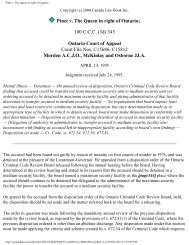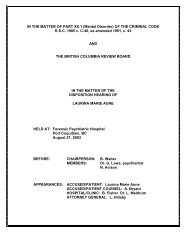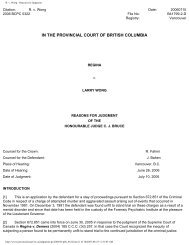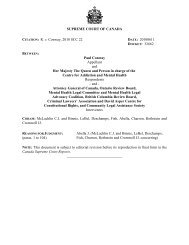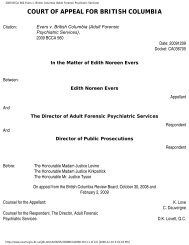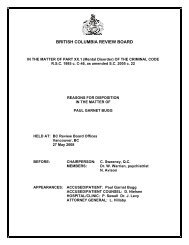R. v. Cuerrier - British Columbia Review Board
R. v. Cuerrier - British Columbia Review Board
R. v. Cuerrier - British Columbia Review Board
Create successful ePaper yourself
Turn your PDF publications into a flip-book with our unique Google optimized e-Paper software.
R. v. <strong>Cuerrier</strong><br />
114 The Olan approach was endorsed in R. v. Théroux, [1993] 2 S.C.R. 5. There the importance of<br />
defining the offence of fraud in light of the underlying objective of promoting honesty in commercial<br />
dealings was emphasized. McLachlin J. described the requisite elements of criminal fraud in these<br />
words, at pp. 25-26:<br />
To establish the actus reus of fraud, the Crown must<br />
establish beyond a reasonable doubt that the accused<br />
practised deceit, lied, or committed some other<br />
fraudulent act. . . . [I]t will be necessary to show that<br />
the impugned act is one which a reasonable person would<br />
see as dishonest. Deprivation or the risk of deprivation<br />
must then be shown to have occurred as a matter of fact.<br />
To establish the mens rea of fraud the Crown must prove<br />
that the accused knowingly undertook the acts which<br />
constitute the falsehood, deceit or other fraudulent<br />
means, and that the accused was aware that deprivation<br />
could result from such conduct.<br />
It was held that mere negligent misrepresentation would not amount to a fraudulent act. However,<br />
"deliberately practised fraudulent acts which, in the knowledge of the accused, actually put the property<br />
of others at risk" should be subject to criminal sanction (p. 26).<br />
115 Next it must be determined whether non-disclosure can constitute fraud. Traditionally, courts<br />
were of the view that fraud does not include non-disclosure (R. v. Brasso Datsun (Calgary) Ltd. (1977),<br />
39 C.R.N.S. 1 (Alta. S.C.T.D.)). However, Olan, supra, and Théroux, supra, have endorsed a wider<br />
interpretation of fraud which can include non-disclosure in circumstances where it would be viewed by<br />
the reasonable person as dishonest. This view was upheld in R. v. Zlatic, [1993] 2 S.C.R. 29. At p. 44<br />
McLachlin J. speaking for the majority, held that if the means to the alleged fraud can be characterized<br />
objectively as dishonest they are fraudulent. This, it was observed, can include the non-disclosure of<br />
important facts.<br />
116 In summary, it can be seen that the essential elements of fraud are dishonesty, which can<br />
include non-disclosure of important facts, and deprivation or risk of deprivation.<br />
117 The principles which have been developed to address the problem of fraud in the commercial<br />
context can, with appropriate modifications, serve as a useful starting point in the search for the type of<br />
fraud which will vitiate consent to sexual intercourse in a prosecution for aggravated assault. It is now<br />
necessary to consider the type of fraud or fraudulent conduct which will vitiate consent in cases of<br />
sexual assault.<br />
C. What Is the Type of Fraud Which May Vitiate Consent in Cases of Sexual Assault?<br />
http://ql.quicklaw.com/qltemp/C2KEwCMAFbZMTYcs/00011scr-00019415%2ehtm (36 of 44)2007-08-21 1:18:15 PM



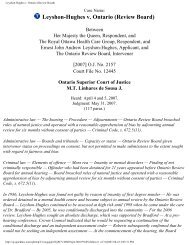
![LaFortune [LaFortunate] (Re) - British Columbia Review Board](https://img.yumpu.com/42779845/1/190x245/lafortune-lafortunate-re-british-columbia-review-board.jpg?quality=85)
